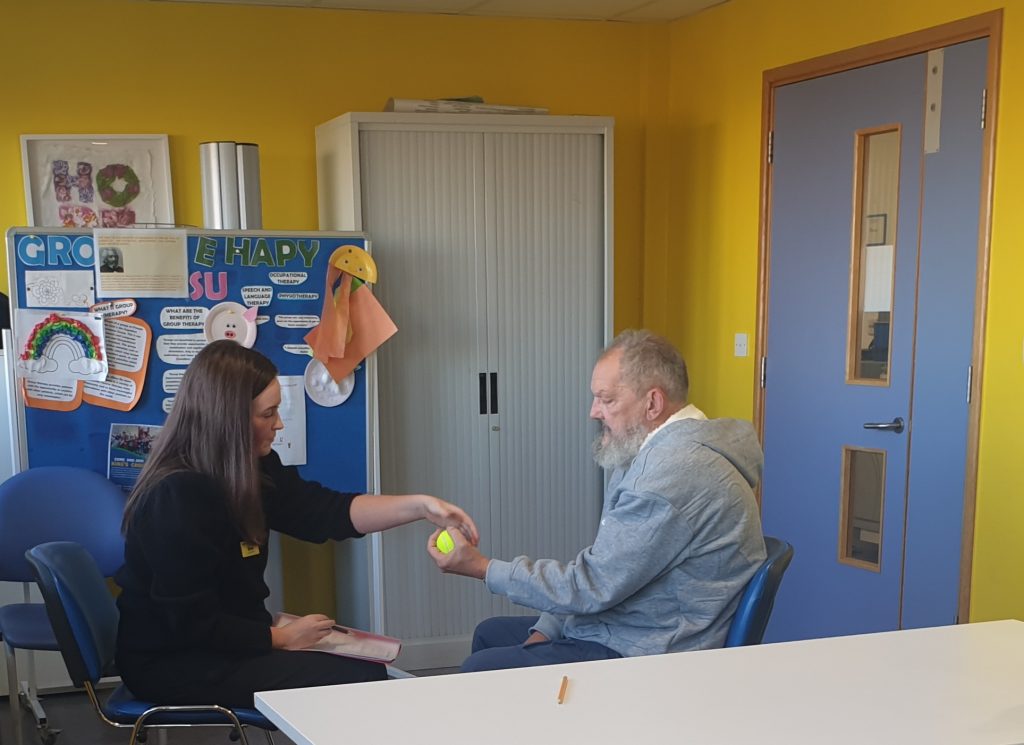Stroke patients trial nerve stimulation therapy in bid to improve hand and arm weakness
29 November 2024 - Treatment delivers electrical pulses to the brain during rehabilitation therapy with the hope of improving recovery after stroke

A new treatment is being trialled by stroke patients at King’s College Hospital using electrical pulses to damaged areas of the brain via a portable device to help patients regain hand and arm mobility.
Patients enrolled in the TRICEPS trial receive a small earpiece designed to stimulate the vagus nerve, along with a portable device worn on the wrist. The aim is to determine if adding the stimulation will enhance arm rehabilitation. It is a self-administered treatment delivered during stroke rehabilitation therapy.
This is the one of the first non-invasive trials of its kind to see whether the treatment, known as transcutaneous (through the skin) vagus nerve stimulation (TVNS), can improve hand and arm weakness in stroke survivors.
The £2m TRICEPS trial, led by Sheffield Teaching Hospitals NHS Foundation Trust and the University of Sheffield, will build on the results of another clinical trial, which showed that when combined with stroke therapy, invasive vagus nerve stimulation improved arm recovery in stroke survivors more than therapy alone.
However, in this earlier trial, the electrical stimulator was surgically implanted and patients had to undergo a general anaesthetic to have the device fitted. The therapy then had to be administered under hospital supervision by a therapist, who triggered the stimulation.
In the TRICEPS trial, the stimulation is triggered via a lightweight, wearable device, which connects to a wired earpiece. The stimulation is automatically activated as the arm is moved during therapy whilst the connected earpiece stimulates the vagus nerve in the ear.
Bill Tahtis, Consultant Occupational Therapist for Stroke and Neurology, who is leading the trial at King’s said, “We are excited to be able to offer stoke patients in the King’s area access to a trial investigating this new treatment.”
“It is open to patients who have arm weakness as a result of an ischaemic stroke that happened between 6 months and 10 years ago, but still have some movement in the affected arm, wrist and fingers.
“The fact it can be delivered in the comfort of patients’ own homes, and without the need for a surgical implant under anaesthetic, means it is accessible to even more patients.”
Carole Kaye, 55, from Epsom, had a stroke two years ago after experiencing numbness in her fingers, and then collapsing at home. The stroke affected the left side of her body, limiting the use of her left arm and hand. Her daughter Hannah found out about the TRICEPS trial after researching treatments online.
Carole said, “Following my stroke, I underwent physiotherapy, and the repetitiveness of the movement helped build strength my arm and hand. This has improved further since my participation in the trial – I can now lift my arm and hand, and stretch my fingers. I still have some weakness but it’s significantly better than it was.
“I am extremely grateful for the care and support I received from the TRICEPS study team at King’s, especially from Bill Tahtis, the occupational therapy consultant. The treatment was easy to use and it fit seamlessly into my daily routine.”
Carole does not know whether she was in the active trial or placebo group but nevertheless is very positive about her experience.
She added, “I’m delighted to be part of a study that’s investigating innovative treatments for stroke recovery. It was also comforting to know that I’m being seen by a dedicated stroke research and therapy team to address my left arm weakness.”
Each year, around 110,000 people have a stroke in the UK, with a third being left with permanent arm weakness, making daily activities challenging. Rehabilitation therapy is the main treatment for people recovering from a stroke. However, many stroke survivors have persisting arm weakness, limiting their function.
Patients can find out more about the trial, including the full eligibility criteria, by calling 07935 514510, emailing [email protected] or visiting www.triceps-trial.com
